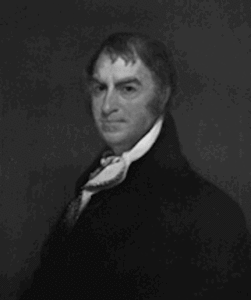
Theodore Sedgwick
*Theodore Sedgwick was born on this date in 1746. He was a white-American attorney, slave owner, and politician. Born in West Hartford in the Connecticut Colony, Sedgwick was the son of Benjamin Sedgwick. His paternal immigrant ancestor, Major General Robert Sedgwick, arrived in 1636 in the Massachusetts Bay Colony. Sedgwick attended Yale College, where he studied theology and law. He did not graduate but continued his law study under the attorney Mark Hopkins of Great Barrington.
Sedgwick was admitted to the bar in 1766. He moved to Sheffield. During the American Revolutionary War, he served in the Continental Army as a major and took part in the expedition to Canada and the Battle of White Plains in 1776. As a young lawyer, Sedgwick and Tapping Reeve pleaded the case of Brom and Bett vs. Ashley (1781), an early "freedom suit," in county court for the slaves Elizabeth Freeman (known as Bett) and Brom. Bett was a Black slave who had escaped from her master, Colonel John Ashley of Sheffield, Massachusetts, because of cruel treatment by his wife. Brom joined her in suing for freedom from the Ashley's.
The attorneys challenged their enslavement under the new state constitution of 1780, which held that "all men are born free and equal." The jury agreed and ruled that Bett and Brom were free. The decision was upheld on appeal by the state Supreme Court. In 1792, Bett marked her freedom by taking the name Elizabeth Freeman, and she chose to work for wages at the Sedgwick household, where she helped rear their children. She worked there for much of her life, buying a separate house for her and her daughter after the Sedgwick children were grown. After Freeman's death, the Sedgwick's buried her at Stockbridge Cemetery in the Sedgwick Pie, the family plot.
The family marked Freeman's grave with an inscribed monument beside that of their fourth child, writer Catharine Maria. A Federalist, Sedgwick began his political career in 1780 as a delegate to the Continental Congress. He was a representative to the state house and then a state senator. He was a charter member of the American Academy of Arts and Sciences in 1780. In 1789, Sedgwick was elected as a Representative to Congress, serving until 1796. That year, he was elected to the United States Senate and served until 1799. In 1799, he was re-elected as a Representative until March 1801.
In 1802, Sedgwick was appointed a justice of the Supreme Judicial Court of Massachusetts. He held the position until his death. According to research conducted by The Washington Post in 2022 and the Massachusetts Historical Society, Sedgwick owned at least one slave. A July 1, 1777, bill of sale shows General John Fellows sold a woman named Ton to the 30-year-old Sedgwick. Sedgwick was nine years younger than John Adams. He admired Adams and worked for his election to the presidency in 1796. However, certain policy disputes arose during Adams' administration. Despite the differences between them, starting on the morning of March 4, 1801, the last day of Adams' term as President and the day after Sedgwick's retirement as Speaker of the U.S. House, Sedgwick and Adams rode together on the carriage trip from Washington, D.C. to Massachusetts. While on his deathbed, Sedgwick converted to Unitarianism. On January 24, 1813, Sedgwick died in Boston, Massachusetts, at age 66.
